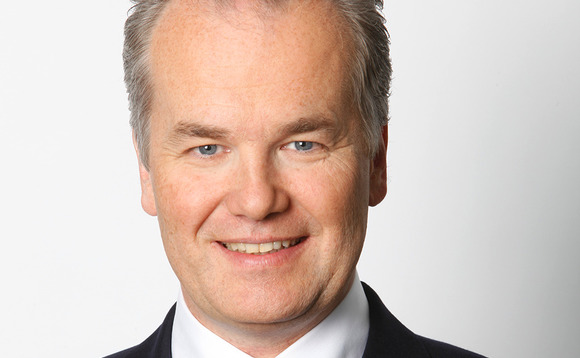
GP Profile: Waterland Private Equity

-
Closed €2bn Waterland Private Equity Fund VII in August 2017
-
420 acquisitions from 80 different platforms in firm's history
-
Approximately 50% of buy-and-build strategies are cross-border
-
Offices in UK, Denmark, Netherlands, Belgium, Germany and Poland
Waterland Private Equity closed its seventh fund on €2bn this summer. Jörg Dreisow, managing partner at the firm's Munich office, speaks to Oscar Geen about the firm's cross-border consolidation strategy and raising a larger fund
"When I joined in 2006, it was essentially a two-country operation. Now we cover all of north-western Europe and Poland," says Waterland Private Equity managing partner Jörg Dreisow. The firm has opened new offices in Manchester and Copenhagen this year and plans to move its second German office from Düsseldorf to Hamburg at the start of 2018.
The GP has raised seven investment vehicles since 1999, increasing the fund size every time. The first fund actually closed under its €100m target on €50m in March 2001 but fund II quickly surpassed its goal of €150m and closed on €170m in 2004. Two years later, the GP's third fund hit its €400m hard-cap, €100m over target, and was significantly oversubscribed. It decided to double up again two years after that and hit an €800m hard-cap after three months on the road in June 2008 before passing the €1bn mark with fund V, which closed on €1.1bn exceeding its €900m target in July 2011.
This was a key milestone for the GP and had implications for the LP base. "Once we passed the €1bn mark in 2011, a lot of our smaller LPs dropped, and we began attracting some of the mega-LPs," says Dreisow. "This is next to our performance – Waterland has been over the last few years consistently present in the top of the performance rankings." A selection of LPs in Waterland's more recent funds include Florida State Board of Administration, Deutsche Bank Private Equity, JP Morgan, HarbourVest, ATP, Adams Street and Danske Private Equity.
Having broken that €1bn milestone, Waterland Private Equity Fund VI held a final close on €1.25bn, with the WPEF VI Overflow Fund closing on €300m, in 2015.

MVision Private Equity Advisers has had a relationship with Waterland since its first fundraise, although for the first vehicle it was through less formal consultations before the placement agent took sole responsibility for the fundraising process from fund II onwards. "We've used MVision since day one; the team there is very good at explaining our strategy and keeps a constant informal dialogue going with LPs. That's why we can raise €2bn in just a few weeks because everyone already knows who we are, what we're about and what our track record is," says Dreisow, referring to the most recent fund, which closed on €2bn in August 2017 after being announced in July.
Scaling up investments
Waterland is an extremely active investor, both in terms of its management strategy and its investment strategy. It specialises in accelerating business growth plans, using bolt-on acquisitions to achieve rapid buy-and-build strategies. Dreisow outlines the figures: "Waterland has made more than 420 acquisitions, making investments in 80 platforms and more than 340 bolt-ons. That already shows you that we make a lot of add-on acquisitions, but we have also made a lot of investments in the past two years that will still make more bolt-ons and push up the average per platform."

In an increasingly competitive market, private equity firms are under growing pressure to differentiate their strategy. This has led to some sector specialisation, but Waterland has a slightly different niche. "We're sector-agnostic but our investments are driven by four themes: ageing population, outsourcing and efficiency, leisure and luxury, and sustainability. These themes create a large universe for us to invest in," says Dreisow.
Even without an official sector focus, Waterland's investment themes have led to a clustering of investments in certain sectors, particularly healthcare where the GP has made 26% of its platform investments, representing 53% of transaction value, according to unquote" data. Dreisow picks a healthcare investment as an example of one of the firm's best success stories: "Seniocare was a great success story because national pride is extremely important in Switzerland and it's nice to be able to say you've created the largest Swiss group in the sector while also generating a healthy return."
When Waterland invested in Seniocare in 2012, it employed 1,000 people and ran 26 nursing homes. It sold the group in August 2015 to Swiss Prime Site, which was already active in the assisted living segment with Tertianum Group. The company employed 1,200 people and ran 29 residential homes by this stage and said an organic growth pipeline had been put in place to secure capacity growth of 50% until 2019.
Two of the most recent platform acquisitions are also in the healthcare sector. Waterland created Median Klinik through the acquisition of a division of RHM Group in 2011 and has increased the number of beds from 2,000 to 18,000 since then. Most recently it acquired elderly care home operator Compassio, with 28 locations and revenues of €110m, as the first step in a new buy-and-build strategy under the ageing population theme called Schönes Leben Group.
Scaling up the firm
Operating in this way has meant a larger staff and a large presence across the regions that Waterland invests in. "It's an intensive strategy that requires intensive work from a large team. We have a staff of more than 70, 50 of whom are investment professionals and they are on the phone with their portfolio companies every day, further executing our deal-sourcing strategy," says Dreisow.
The firm has also been unafraid of scaling up its operations in the face of political uncertainty. In February 2017, it opened a Manchester office, stating that while the move was partly a "natural step", it was also partly motivated by the Brexit vote, which it believes will present significant investment opportunities in the UK.
Waterland followed this expansion by opening a Copenhagen office in September. At the time, managing director Kaspar Kristiansen told unquote" that the new team would begin by looking at add-on acquisitions for existing portfolio companies before starting to look at potential platform investments in the region. It simultaneously announced its intention to move the Düsseldorf office to Hamburg in early 2018.
Key People
Frank Vlayen, group managing partner, joined Waterland in 2005 and is responsible for the day-to-day management of the group, as well as investor relations and the activities of Waterland in Antwerp. Prior to joining Waterland, he worked for Accenture UK, advising utilities and industrial companies on M&A strategy.
Hans Scheepers, managing partner, joined Waterland in 2004 and is responsible for investments in the Netherlands. Prior to joining Waterland, he was managing director of 1st Broadband, where he recruited a management team and attracted expansion capital investment.
Jörg Dreisow, managing partner, joined Waterland in 2006 and is responsible for Waterland's German operations. He previously worked as head of group development at TA Triumph-Adler and was CFO of the presentation and media technology division.
Latest News
Stonehage Fleming raises USD 130m for largest fund to date, eyes 2024 programme
Multi-family office has seen strong appetite, with investor base growing since 2016 to more than 90 family offices, Meiping Yap told Unquote
Permira to take Ergomed private for GBP 703m
Sponsor deploys Permira VIII to ride new wave of take-privates; Blackstone commits GBP 200m in financing for UK-based CRO
Partners Group to release IMs for Civica sale in mid-September
Sponsor acquired the public software group in July 2017 via the same-year vintage Partners Group Global Value 2017
Change of mind: Sponsors take to de-listing their own assets
EQT and Cinven seen as bellweather for funds to reassess options for listed assets trading underwater








